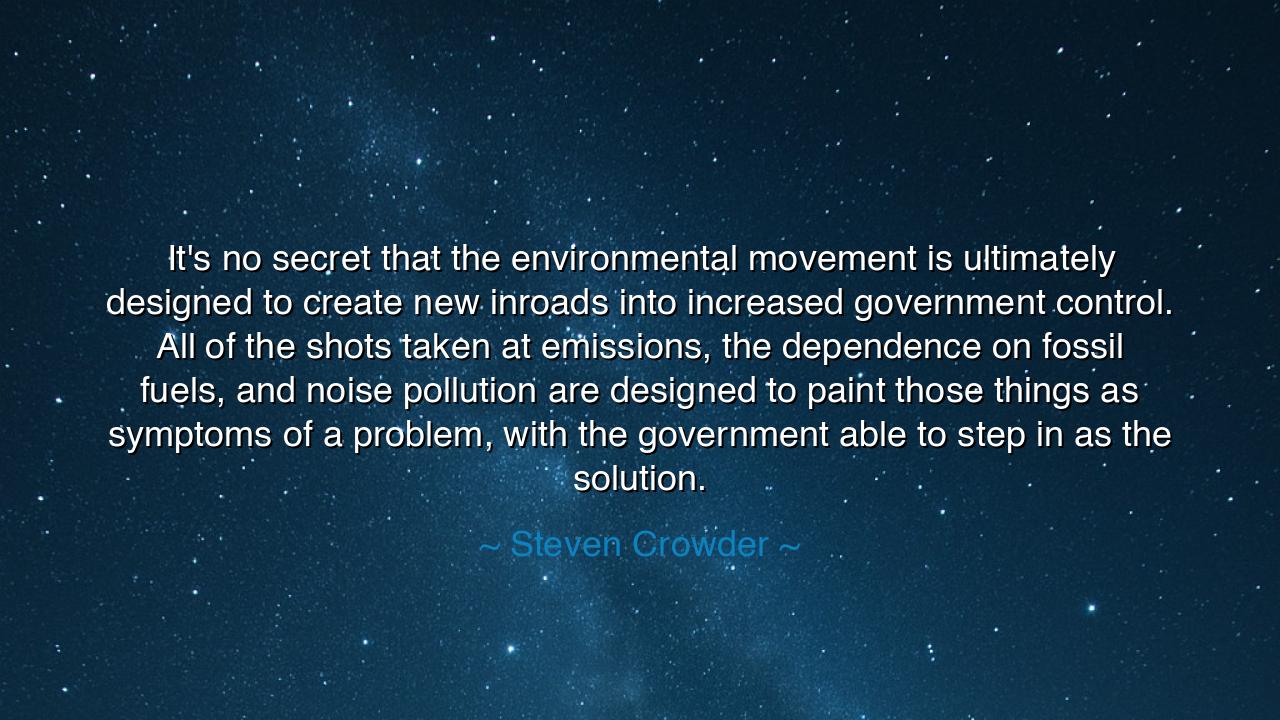
It's no secret that the environmental movement is ultimately
It's no secret that the environmental movement is ultimately designed to create new inroads into increased government control. All of the shots taken at emissions, the dependence on fossil fuels, and noise pollution are designed to paint those things as symptoms of a problem, with the government able to step in as the solution.






The words of Steven Crowder—“It’s no secret that the environmental movement is ultimately designed to create new inroads into increased government control. All of the shots taken at emissions, the dependence on fossil fuels, and noise pollution are designed to paint those things as symptoms of a problem, with the government able to step in as the solution.”—reveal a sharp and controversial reflection on the nature of power, fear, and control. Beneath his skepticism lies an ancient warning echoed throughout the ages: that every movement, no matter how noble its origin, can be transformed into an instrument of authority. Crowder’s statement is not a rejection of environmental care—it is a caution against the concentration of power, a reminder that even the guardians of virtue must be watched lest they become masters instead of servants.
To understand his words, one must look beyond the heat of debate and into the heart of history. The environmental movement, born from the love of nature and the desire to preserve the earth, began as a cry of conscience. It sought to defend forests from greed, oceans from waste, and air from poison. Yet as the movement grew, it entered the halls of law and governance, where ideals often become instruments. Crowder’s observation springs from this tension—the ancient struggle between freedom and authority, between the impulse to protect and the temptation to command. He warns that when every human action is seen as an ecological offense, the door is opened for rulers to regulate not just industries, but the very rhythm of human life.
This is not a new concern. The historian Tacitus, writing of the Roman Empire, once remarked that “the more corrupt the state, the more numerous the laws.” His words reflect a truth that transcends time: that the road to tyranny is often paved with good intentions. In ancient Rome, edicts meant to preserve order eventually became chains upon the citizen. Likewise, Crowder’s critique suggests that in the modern age, the call to save the planet could—if left unchecked—become a tool for centralized power, where fear of environmental collapse is used to justify control over energy, commerce, and even personal choice. His quote, then, is a challenge not against environmentalism itself, but against the use of moral causes as political weapons.
Yet there is complexity here, for truth often dwells between extremes. History shows that great environmental progress—such as the cleaning of rivers, the protection of wildlife, and the fight against smog—has indeed required government action. The Clean Air Act, for example, rescued cities from suffocating pollution and gave generations the gift of breathable skies. But the same history also reveals that power, once expanded, rarely retreats. The wise must therefore hold both truths at once: that structure is needed to preserve the common good, but vigilance is needed to ensure that such structure does not suffocate liberty.
Consider the story of the Soviet Union, where grand promises of equality became instruments of oppression. Under the banner of collective good, individuals lost autonomy, and dissent became forbidden. The lesson is not that collective goals are evil, but that unchecked authority—no matter its cause—corrupts even the purest intentions. Crowder’s warning belongs to this tradition: he reminds us that a movement claiming to save humanity must never forget the humanity it seeks to save. For when compassion turns to compulsion, and stewardship becomes surveillance, the spirit of freedom begins to fade.
There is a deeper, moral wisdom within his skepticism. Crowder invites each person to look inward before demanding government solutions—to live as stewards of their own choices, rather than placing the burden entirely upon rulers and institutions. True environmental virtue, he implies, is born from personal responsibility: to waste less, to respect creation, to innovate without domination. If every individual lived with conscience, the need for sweeping mandates would diminish. The danger lies not in caring for the earth, but in surrendering our agency to those who claim they alone can protect it.
The lesson, therefore, is one of balance. Let the people cherish the earth, but let them also cherish freedom. Let governments act when necessary, but let them act with humility and restraint, knowing that the power to protect can easily become the power to control. The ancients taught that the noblest ruler is the one who governs least, because his people have learned to govern themselves. So too in our age, the noblest environmental action is not imposed from above, but lived from within.
And so, Crowder’s words stand as a warning for the future: that in our passion to heal the world, we must not forge new chains in the name of salvation. Let every citizen remember that stewardship and sovereignty must walk together, hand in hand. For a world that is green but not free is no paradise—it is a gilded cage. True harmony lies not in domination, but in balance: where man honors the earth, and power honors man.






AAdministratorAdministrator
Welcome, honored guests. Please leave a comment, we will respond soon